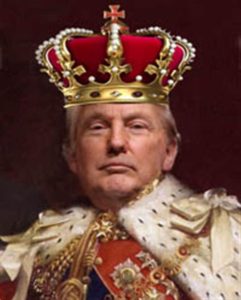 This article contains liberal opinion.
This article contains liberal opinion.
No one is less suited to be president than the owner of a family business in the habit of giving orders and having them obeyed by his employees without question.
The U.S. government is not a family business. It doesn’t belong to the person who runs it. He exercises power in their name, on their behalf, and for their benefit (i.e., government “of the people, by the people, and for the people”). Government employees owe their loyalty to the public, not to him personally.
In our system of government, power is diffused and spread around. It’s not concentrated in one person, as in a dictatorship, monarchy, or the owner of a private business. The U.S. government is run by hundreds of people, with decision-making power divided and balanced among executive, legislative, and judicial branches.
It’s true that leadership is concentrated in the presidency. But the president is a leader, not a commander, and it’s a crucial distinction. A president must be able to marshal support for his policies. This requires a great deal of political skill and experience. The White House isn’t an entry-level job. It’s the most demanding of all our political jobs; some people call it the hardest job of any kind in the world.
It was a mistake to elect an amateur with no political skills or experience, and lacking the temperament to be an effective politician, to this position.
I’m generally against electing businessmen to political offices or putting them in charge of government agencies. Business and public management are two different occupations, requiring different skill sets. That’s why universities have separate schools of business management and public management. The Harvard School of Government (officially the Harvard Kennedy School) doesn’t prepare students for business careers, and Wharton’s MBA program doesn’t prepare its students for government careers.
It sometimes happens that voters reach into the business community for a leader when government seems to be flailing, or governors may appoint a prominent businessman to lead a troubled public agency. I’ve seen it happen. It’s not impossible for a capable business leader to make the transition, but few do, and these experiments usually don’t turn out well.
Trump, who is more of a poseur than a successful businessman, couldn’t make the transition at all. He never shook off his business-owner mentality, and tried to govern like a king. That didn’t work, and shouldn’t have worked. We’re not a monarchy.
It’s often said that Trump’s supporters wanted someone to “shake things up.” Frustrated by not getting their way under the rules, they wanted someone who would break the rules, and like him precisely because he does. That’s also the mentality of people who drive 50 mph on a residential street with a 25 mph speed limit, endangering everyone who lives there. In my book, such people are outlaws.
Our system was created in the aftermath of a revolution to throw off the chains of a monarchy. It was designed with checks and balances to prevent any one person from getting too much power. When Trump ignored checks and balances, that violated the political rights of millions of Americans. They didn’t appreciate it. They had every right to vote him out of office, and trying to obstruct them from exercising that right is another violation of their political rights.
Trump tried to be a king. Instead, he ended up a fallen king. Good riddance. A king — especially a corrupt, dishonest, incompetent one — is the last thing the majority of Americans need or want. This is a free country, and Trump’s supporters have a right to vote for him. They also have a right to be disappointed, upset, even angry, if he loses. But when they’re beaten in elections, they have no right to get their way.
That’s how things have always worked in this country, and if we’re lucky, that’s how they still work.